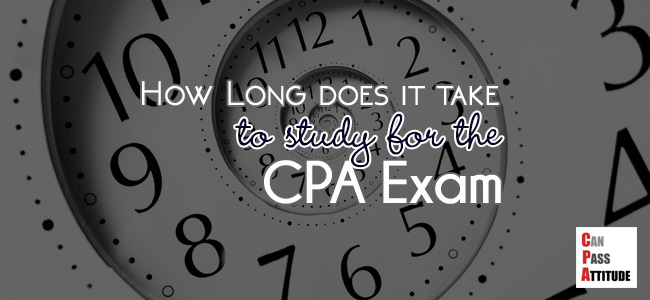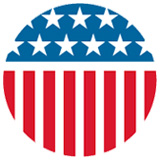- You are here:
- Home »
- Blog »
- CPA Exam Details »
- How Many Hours Do You Need to Study for CPA Exam?
How Many Hours Do You Need to Study for CPA Exam?

How long to study for the CPA Exam? This is one of the most frequently asked questions from my readers. And I understand why: if you’re studying for the CPA Exam, you want to know what your time commitment will be.
However, how long you study for the CPA Exam largely depends on how disciplined you are and whether you have commitments outside of the exam that demand your attention. Plus, your CPA preparation time can be cut down with good CPA Exam review courses.
In this article, I’ll cover studying for the CPA Exam, how long it will take, and some tips for making the whole process a little easier. Because if you have a good understanding of what’s ahead, you’ll be better prepared to set aside time each day to study.
How Long to Study for CPA Exam: Estimate = 330-440 Hours
As a general rule, you’ll need 80-150 hours to study for each session of the exam, assuming you have basic accounting knowledge. Roughly speaking, you will need around 330-440 hours.
Studying for Each Section
The CPA Exam is an aggressive exam with four parts:
- AUD: Auditing and Attestation
- FAR: Financial Accounting and Reports
- REG: Regulation
- CPA Discipline section (3 different sections are available, and you must pass one of them)
Most candidates spend more time preparing for the FAR and REG parts of the exam and less time on AUD and the CPA Discipline section. However, your individual study time will depend on your pre-existing knowledge in each subject area.
Which Section is the Hardest?
Based on your previous academic and work experiences, you will probably find some sections of the CPA Exam harder than others. And therefore, you’ll probably study for some sections more than others. But on average, here’s what most candidates say about the CPA Exam sections.
AUD
According to the AICPA, only 47.97% of people passed the AUD section in Q1 for 2020. That’s about tied with the pass rate for FAR. So based on the pass rates, most people find AUD and REG the hardest. However, some accountants think that AUD approaches auditing concepts as you might in a college course but not necessarily as you would in real life.
FAR
Only 46.37% of candidates passed FAR in the first quarter of 2020. Most people think FAR is the hardest because it covers the largest number of accounting topics.
REG
The REG section is probably the second easiest section on the CPA Exam. Therefore, about 55% of candidates passed it in Q1 in 2020. REG involves a lot of memorization, so be prepared to study. However, experience does help with REG, especially if you’ve been working as a tax accountant.
CPA Discipline Sections
At the beginning of 2024, the CPA Exam eliminated the BEC section and replaced it with the CPA Discipline sections. Basically, there are three sections to choose from, but you only need to take and pass one. The CPA Discipline sections include:
- Business Analysis and Reporting (BAR)
- Information Systems and Controls (ISC)
- Tax Compliance and Planning (TCP)
Since the CPA Discipline sections were just introduced to the exam in January 2024, we don’t have pass rates, yet.
How to Get a Better Estimate
If you have a busy life, it is best to find better ways to understand and keep track of how long it takes for the CPA journey. Here are my suggestions:
1. Utilize Available Online Study Planners
A CPA Exam study planner will help you break down all of the topics you need to review and gives you benchmarks so you cover all of your study materials before your exam. Review providers like Becker, Gleim, and Wiley CPAexcel have interactive online study planners that help you plan ahead. These systems calculate the time you need to complete each study unit based on the average time required for students in their study courses.
These systems also keep track of your progress based on the time you log on to the study sessions. So when you lag behind, they send you an email reminder and keep you on track.
Roger CPA Review uses an Excel sheet as an online study planner. Although it’s not as tech-savvy as the systems used by Gleim and CPAexcel, many of their students prefer the flexibility of an Excel sheet.
2. Create Your Own Planner
If you don’t use a review provider that has a customizable study planner, you can create your own. Start by listing all of the topics you need to review for the CPA Exam. Then, based on the target date you want to sit for the exam, figure out your deadlines to study each topic. Then, you can keep track in an Excel sheet or mark important milestones in your calendar.
In the video above and in my book, I list typical studying scenarios. You can pick the one that fits your personal situation the most and follow it accordingly.
Factors Affecting Your Study Time
The AICPA recommends that CPA candidates spend 300-400 hours studying for the CPA Exam. However, that timeframe can quickly increase if you’re not studying effectively. So if you think your study time isn’t getting you anywhere, consider the following:
1. Do you have a study plan?
The CPA Exam covers a lot of material. In fact, it covers so much that you need a study plan to help you prepare. If you think that you’ll be fine if you just review your old college textbooks and some updated accounting regulations, you’re wrong. You need a study plan that outlines exactly what concepts you need to review. Otherwise, you’re going to waste your time. CPA candidates who try to go it alone without a study plan usually end up spending too much time reviewing concepts they already know and not enough time reviewing what they don’t.
But don’t worry–if you purchase the right CPA Exam review course, you don’t have to come up with a study plan on your own. In fact, some review courses help you with that process. For instance, Gleim helps you develop a study plan based on your exam date and breaks down the content into manageable Gleim study units.
2. Do you have a study schedule?
 Along the same lines as the point above, you absolutely need to set a study schedule. At this point in your career, passing the CPA Exam is just as important as everything else on your “To Do” list. So make it a priority. Figure out when you will study every day, add it to your daily schedule, and keep those study promises you make to yourself. If you study at a set time every day, you get into the routine, and studying doesn’t seem like such a burden in your daily life.
Along the same lines as the point above, you absolutely need to set a study schedule. At this point in your career, passing the CPA Exam is just as important as everything else on your “To Do” list. So make it a priority. Figure out when you will study every day, add it to your daily schedule, and keep those study promises you make to yourself. If you study at a set time every day, you get into the routine, and studying doesn’t seem like such a burden in your daily life.
3. Are you using a review course?
 The right CPA exam prep materials can be the key to your success. Today’s review providers have created courses that make studying for the CPA Exam go much smoother and much faster than doing it on your own. The best CPA study materials are designed to cover all of the topics that appear on the CPA Exam as outlined in the AICPA’s Uniform CPA Examination Blueprints. They often include questions that appeared on previous exams, so you can get a good feeling for the exam’s level of difficulty. Many review courses include online webinars or taped video lectures, but some allow you to sign up for a CPA class in limited locations.
The right CPA exam prep materials can be the key to your success. Today’s review providers have created courses that make studying for the CPA Exam go much smoother and much faster than doing it on your own. The best CPA study materials are designed to cover all of the topics that appear on the CPA Exam as outlined in the AICPA’s Uniform CPA Examination Blueprints. They often include questions that appeared on previous exams, so you can get a good feeling for the exam’s level of difficulty. Many review courses include online webinars or taped video lectures, but some allow you to sign up for a CPA class in limited locations.
 4. Are you using the best tools for you?
4. Are you using the best tools for you?
Every CPA candidate learns differently. So pick the CPA Exam review course that comes with learning tools suited to your needs. For example, if you learn best by watching videos, pick a course with outstanding video content. If you like to highlight textbooks, be sure to use a course that provides hard copies of their materials. Conversely, if you’re someone who doesn’t benefit from using flashcards, don’t waste your time with them.
 5. Are you drilling your sample questions?
5. Are you drilling your sample questions?
Of course, it’s important that you master the content that’s going to be on the CPA Exam. However, it’s just as important that you master how to take the exam. People who have already passed the exam swear by the following method: keep drilling your sample questions over and over and over again until you pass 80-85% of them on your mock exams. So, it’s critical to review with a good test bank of sample questions.
How to Prepare for CPA Exam
 How to study for the CPA Exam is just as important as how long to study. Yes, you have to sit down and put in the study time. But you’ll squander your precious free time if you study without focus.
How to study for the CPA Exam is just as important as how long to study. Yes, you have to sit down and put in the study time. But you’ll squander your precious free time if you study without focus.
Keep in mind that this exam is academic in nature. That is, some of the questions “go by the book” and don’t necessarily only emphasize the daily skills you’ll use as a CPA. So even if you’ve been working as a professional accountant for many years, you should still use study material for the CPA Exam.
CPA Exam study guides will concentrate your efforts and prevent you from going off track. Here are a few ideas to consider:
Purchase a CPA Review Course
A good CPA Exam review course will include all of the materials you’ll need to pass the exam on your first attempt. There are several good exam prep providers on the market, and I have a review of the best review courses in this article. Most courses come with textbooks, lectures (video and/or audio), mock exams, and test question banks. Many courses are now using adaptive e-learning platforms that access your progress and create personalized study plans that help you maintain your focus. Some even include personalized support and face-to-face classroom-style instruction. If you find a review course that fits your learning style and you stick to your study plan, you will probably spend less time studying and end up with a higher exam score.
Free CPA Study Materials
In addition to purchasing a CPA Exam review course, I also recommend that you take advantage of the free study materials that are available online. I definitely wouldn’t solely rely on these materials for your exam prep, but they can supplement a good review course. Here are some ideas:
- The AICPA publishes the Uniform CPA Examination Blueprints that outline the broad concepts that the exam will test. At a minimum, you should review the blueprints to make sure you’re familiar with these topics.
- In addition to the Blueprints, the AICPA also has a shortened sample test and questions on its website. You should take this short mock exam before you take the “real” one. On the AICPA website, you’ll also find a tutorial about using the exam software.
- Several CPA Exam review providers have free trials of their courses. This is a great way to get access to lots of sample questions and lectures. Some to consider include the free 5-day trial from Surgent CPA Review and the 7-day trial from Roger CPA Review. Gleim Exam Prep has free some test prep materials, but you have to sign up for an account to access them. Becker CPA and Wiley CPAexcel both offer an incredible 14-day free trial to their material, which I would recommend even if you chose a different exam review provider.





Other FAQs
What’s the Testing Window for the CPA Exam?
In the past, candidates could only sit for the CPA Exam during certain testing windows each quarter. And then from 2020 to 2023, the CPA Exam followed a continuous testing model, meaning that you could take the exam whenever a Prometric testing center was open. However, since January 2024, the CPA Exam windows are back. That is, candidates can only take the CPA Exam during certain periods. What’s more, the Core sections (AUD, FAR, and REG) have different dates than the CPA Discipline sections. So to keep you informed, we have an entire post dedicated to the 2024 CPA Exam Schedule and Blackout Dates.
Can I take all 4 parts in one go? Should I?
If you have a good review course and create a study schedule (and stick to it!), you can take all 4 parts at once. I took all four exam sections over 2 days and passed with solid scores, so it’s certainly possible. But should you? Well, that really depends on the amount of time you’ll be able to dedicate to studying. Check out this full-length article to learn about my experience.
Where are the testing centers?
Candidates must take the CPA Exam at a Prometric test center. However, if you might be applying in one state and taking the exam in another, click here for some advice.
How long is the CPA Exam?
Each part of the CPA Exam lasts 4 hours for a total exam time of 16 hours.
Can I still pass if I’ve been out of college for a long time?
My “more experienced” readers who have been out of college for a while often ask me about their chances of passing the CPA Exam. It’s commonly recognized that the exam is an “academic” one. Therefore, if you’ve recently graduated from college, you might need to spend less time studying. For example, if you just took a governmental accounting class, you might find those questions a little easier. But still, experience does help, especially on the taxation questions. If you’ve been working as a tax accountant, you might not think the tax questions in REG are tough. So while being fresh out of college can cut down on your study time, experience helps, too.
Want to Pass the CPA Exam on Your First Attempt?
Without knowing the size of the task ahead, it’s too easy for life’s daily distractions to derail your studying. Therefore, it’s critical that you understand the breadth of the CPA Exam before you get started. But at the end of the day, what’s important is how well you’ve mastered the material, not how many hours a day you log studying.
If you find this article helpful, like my Facebook page!
Also, consider signing up for my mini-series, which is completely free. I have two versions designed for candidates with different backgrounds:
 |
 |
| For US Candidates (Those with US degrees, or graduate/live/work in the US) |
For Intl Candidates (Those who study abroad, or graduate/live/work outside of the US) |
About the Author Stephanie Ng
I am the author of How to Pass The CPA Exam (published by Wiley), and I also passed all 4 sections of the CPA Exam on my first try. Additionally, I have led webinars, such as for the Institute of Management Accountants, authored featured articles on websites like Going Concern and AccountingWeb, and I'm also the CFO for the charity New Sight. Finally, I have created other accounting certification websites to help mentor non-CPA candidates. I have already mentored thousands of CPA, CMA, CIA, EA, and CFA candidates, and I can help you too!

 4. Are you using the best tools for you?
4. Are you using the best tools for you? 5. Are you drilling your sample questions?
5. Are you drilling your sample questions?